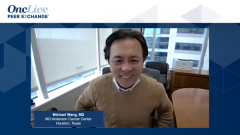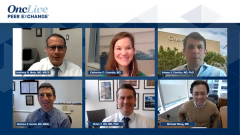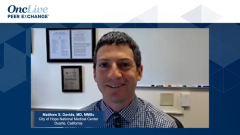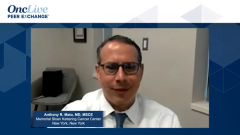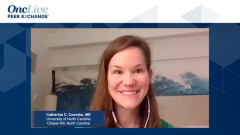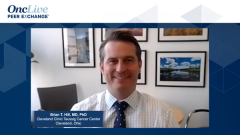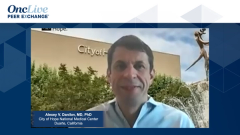
Disease Overview: Mantle Cell Lymphoma
Anthony R. Mato, MD, MSCE, introduces the panel, and Alexey V. Danilov, MD, PhD, provides an overview of the incidence, presentation, pathologic features, and treatment landscape for mantle cell lymphoma.
Episodes in this series

Anthony R. Mato, MD, MSCE: Hello and welcome to this OncLive® Peer Exchange titled “Recent Advances in the Treatment of Chronic Lymphocytic Leukemia (CLL) and Mantle Cell Lymphoma (MCL).” My name is Anthony Mato from Memorial Sloan Kettering Cancer Center, and I'm joined today by a panel of experts in both CLL and mantle cell lymphoma. I'd like to welcome my esteemed fellow panelists, and if you wouldn't mind, please introduce yourself.
Catherine C. Coombs, MD: Hi. My name is Catherine Coombs. I am an assistant professor at the University of North Carolina.
Alexey V. Danilov, MD, PhD: Hi. Alexey Danilov. I'm a professor at City of Hope National Medical Center, and I lead the lymphoma program here.
Matthew S. Davids, MD, MMSc: Hi. I'm Matt Davids. I'm an associate professor of medicine at Harvard Medical School, and I'm at Dana-Farber Cancer Institute in Boston.
Brian T. Hill, MD, PhD: Hi. I'm Brian Hill. I'm the director of lymphoid malignancies at the Cleveland Clinic.
Michael Wang, MD: I'm Michael Wang, professor in lymphoma and myeloma at [the University of Texas] MD Anderson Cancer Center in Houston. Thank you.
Anthony R. Mato, MD, MSCE: Great panel that we have today, so welcome, everyone, and thanks so much for getting together to discuss the recent advances in the field. Today, we're going to discuss a number of recent updates in the treatment of CLL and MCL that were presented at the key conferences in 2022, largely the ASCO (American Society of Clinical Oncology) [annual] meeting and the EHA (European Hematology Association) meeting, which most of us attended. We'll discuss the data in the context of guidelines, the treatment landscape, and its impact on clinical practice, so let's get started on our first topic.
We're going to focus initially on MCL because there's been a lot of data presented that is potentially practice-changing, but just to make sure we give everybody some background on the field, I was thinking, Alexey, we could start with you just describing MCL in terms of how common it is and how it presents. [Give us] a little word on prognosis and your thoughts about how it's differentiated from either CLL or the other B-cell lymphomas, Then, how do you personally define risk? If anyone wants to weigh in or add any additional comments, please feel free to do so.
Alexey V. Danilov, MD, PhD: Thank you, Anthony. I'm happy to start with this. MCL is a fairly uncommon subtype of B-cell non-Hodgkin lymphoma. It only [has] about 3,000 cases in the United States diagnosed every year. There are 2 key subtypes: one is classical MCL, and the other one is leukemic non-nodal, which is mostly characterized by splenomegaly, bone marrow, [and] peripheral blood involvement but typically would not have them for lymphadenopathy. There are some key molecular distinctions between the 2, but the parapneumonic feature of MCL is rearrangement of cyclin D1 with translocation of 11;14 chromosomal translocation, which is determined by FISH (fluorescence in situ hybridization), of course.
When MCL presents, it is typically aggressive and presents with B symptoms and progressive lymphadenopathy, cytopenia. Most patients require therapy at the time of diagnosis. However, some patients may follow this indolent course, and those would typically be the patients with leukemic non-nodal MCL, and they can be almost monitored like patients [with] CLL for several years. I certainly have a few dozen of these patients whom I've oriented for a number of years at this time, and we have some data demonstrating that, for patients who can be monitored, treatment can be safely delayed.
In terms of treatment of MCL in the frontline setting, that really depends on a couple of factors. First is to define the high-risk MCL, and I think Dr. Wang might have slightly different definitions, but when I think of high-risk MCL, I first think of genetics. Patients who have abnormalities of TP53, particularly TP53 gene mutation but as well as del(17p) or patients who have complex karyotype, those genetic abnormalities which typically render inferior prognosis. Then, morphologically blastoid MCL and, to an extent, pleomorphic MCL also behave less well, and typically I would insist [on treating] them [with] therapies that we can offer. MCL standard therapy still incorporates chemoimmunotherapy, and there are a variety of regimens [that] we use for young, fit patients who are candidates for autologous stem cell transplant. There is the Nordic regimen. There is R-hyper-CVAD (rituximab and cyclophosphamide, vincristine, doxorubicin, and dexamethasone) regimen extensively used at [The University of Texas] MD Anderson [Cancer Center]. The regimen [that] is becoming in favor, so to speak, is bendamustine-rituximab in combination with RIC (reduced intensity conditioning), and that is typically followed by autologous stem cell transplant. Now there is some data that in high-risk MCL like TP53 or complex karyotypes, stem cell transplant may not be as helpful. These patients are the best candidates for clinical trials in [the] frontline setting with novel agents.
Finally, if patients are not good candidates for stem cell transplant, then standard regimens include bendamustine-rituximab or R-CHOP (rituximab, cyclophosphamide, hydroxydaunorubicin hydrochloride, vincristine, prednisone), bendamustine-rituximab typically is associated with progression-free survival of about 3 years in MCL. There is also [bortezomib] R-CHOP combination. Basically, there are multiple factors [that] ultimately help us decide what treatment regimen to pursue, and that's determined by the patient's age [and] performance status as well as the genetics characteristic of the disease.
Transcript has been edited for clarity.


